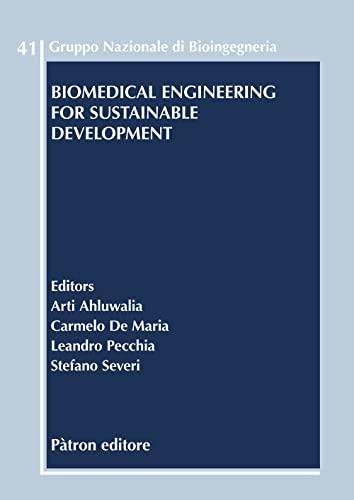
This book explores the crucial role of biomedical engineering in supporting healthcare workers, medical technology manufacturers, policymakers, and patients. It emphasizes the importance of sustainability in biomedical engineering and highlights key enabling technologies for sustainable development, such as 3D printing, mobile technologies, and artificial intelligence. The book also discusses sustainable drug delivery systems, eco-conscious packaging, water conservation in healthcare facilities, and environmental monitoring systems.
Per qualsiasi esigenza Scrivici su WhatsApp, oppure visita la pagina contattaci.
Spedizione gratuita in tutta Italia, per maggiorni informazioni: pagina spedizioni.
Biomedical engineering (BME) plays a vital role in supporting healthcare workers, medical technology manufacturers, policymakers, and patients. In today's rapidly changing world, facing novel, global, and complex challenges, BME is called upon to adopt a more holistic dimension, embracing new risks and opportunities.
The United Nations' 2030 Agenda for Sustainable Development highlights 17 Sustainable Development Goals (SDGs), emphasizing the principle of "leaving no one behind." SDG3, in particular, focuses on Good Health and Wellbeing, striving for worldwide access to equitable healthcare. This goal underscores the critical need for sustainable solutions in biomedical engineering.
Medical technology designers often overlook the challenges posed by resource-limited settings. This oversight hinders the safety and efficiency of healthcare services, exposing patients and healthcare workers to further hazards. The XLI GNB school offers students an alternative perspective on the problems and applications of biomedical engineering, emphasizing a frugal and contextualized approach. This approach is crucial for fostering the accessibility of safe healthcare without borders, not only in low-middle income countries (LMICs) but also in other contexts where resources may be lacking, such as during natural disasters, epidemics, and pandemics.
Biomedical engineers are revolutionizing drug delivery methods by developing sustainable alternatives. These include biodegradable drug carriers, controlled-release systems, and targeted delivery mechanisms that reduce drug wastage, minimize adverse effects, and improve treatment outcomes. By focusing on sustainable drug delivery, biomedical engineers are enhancing therapeutic efficacy while minimizing the environmental impact of pharmaceutical interventions.
To minimize waste and promote sustainability, biomedical engineers are designing eco-conscious packaging solutions. Biodegradable and recyclable materials are used to package medical devices, reducing plastic waste and creating a more environmentally friendly supply chain. By prioritizing sustainable packaging practices, biomedical engineers are minimizing the ecological footprint of healthcare products and contributing to a greener future.
Biomedical engineers are implementing innovative water-saving technologies in healthcare facilities. These include efficient water recycling systems, advanced filtration methods, and smart water management systems, significantly reducing water consumption and minimizing the ecological impact of healthcare operations. By prioritizing water conservation, biomedical engineers are contributing to sustainable resource management and ensuring the long-term availability of clean water for healthcare facilities.
Biomedical engineers are developing advanced environmental monitoring systems to safeguard healthcare facilities and protect public health. These systems utilize sensor technologies, real-time data analysis, and predictive modeling to detect and mitigate environmental hazards, ensuring a safe and sustainable healthcare environment. By employing robust environmental monitoring solutions, biomedical engineers are contributing to the creation of healthcare facilities that prioritize the well-being of patients and the surrounding environment.
The future of biomedical engineering for sustainable development is bright. By combining bioengineering with other fields, such as computer science, materials science, and environmental engineering, we can create innovative solutions that address the world's most pressing healthcare challenges while promoting environmental sustainability. This interdisciplinary approach will be crucial for developing a more equitable and sustainable healthcare system for all.